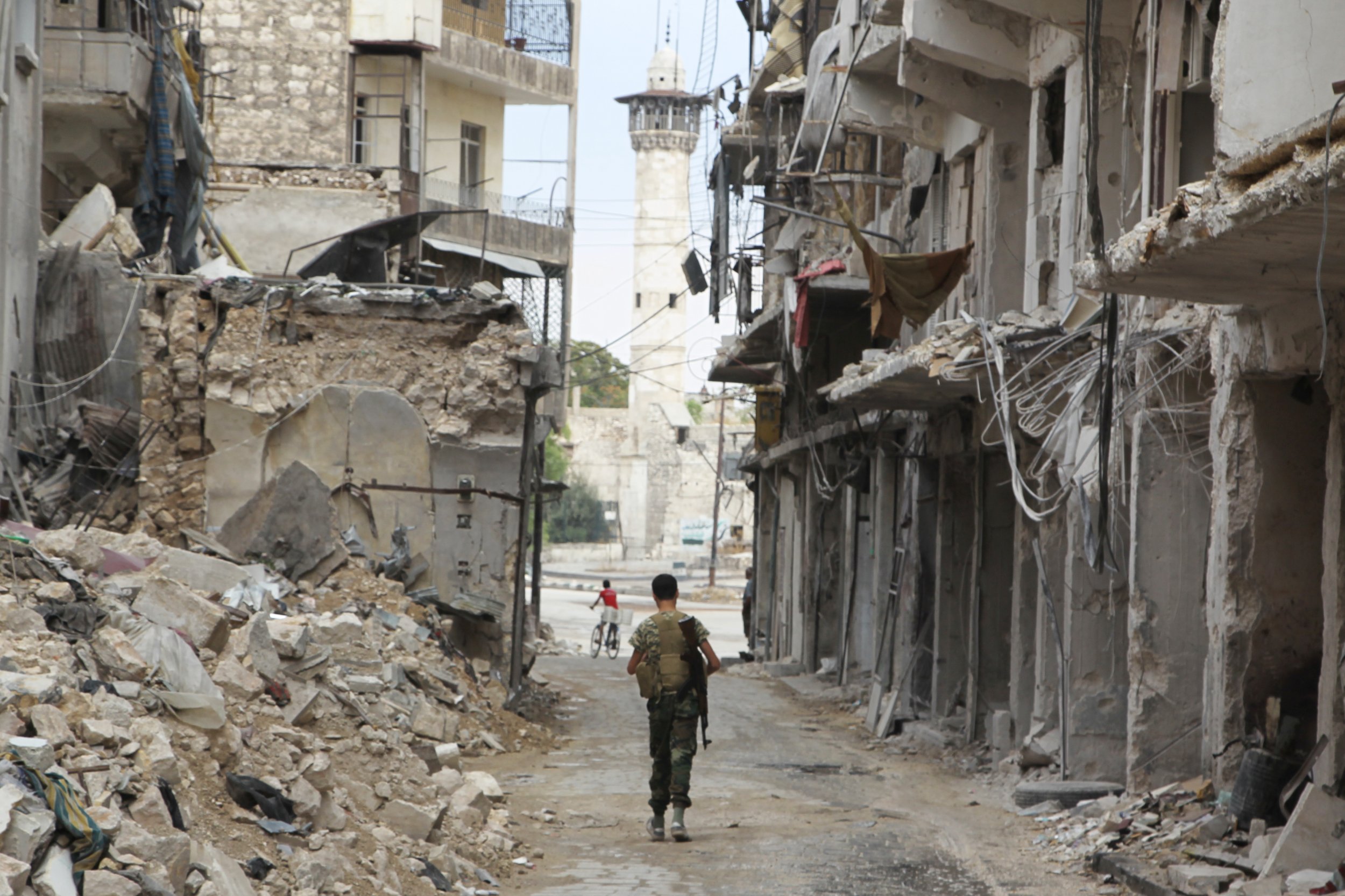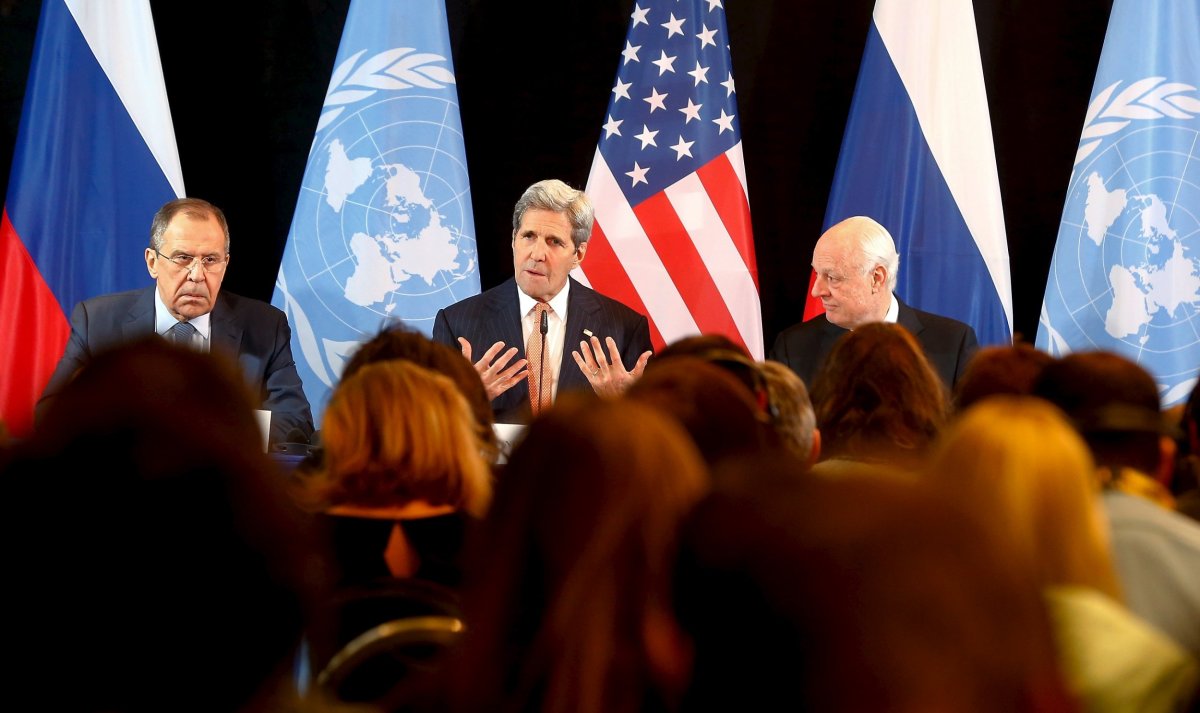
On Thursday, the International Syria Support Group (ISSG)—a group of 17 international powers—outlined its agreement to press for a "cessation of hostilities" in Syria within a week. If implemented, the deal, which also includes provisions over humanitarian access, has the potential to save lives and alleviate suffering. But, its provisions are vague, leaving key points open to interpretation even if it is enacted.
Crucially, there is little indication that the substantive disagreement in the Russian and U.S. position over who can be considered a legitimate opposition group has been bridged. Without such agreement the ISSG announcement is yet another missed opportunity, and a cover for the continued assault on the moderate opposition.
In his remarks to the press, John Kerry, the U.S. secretary of state, acknowledged that the agreement is currently "words on paper" that need to be translated to "actions on the ground." His announcement was greeted with cautious optimism, but this has eroded over the days since, as Russia has stepped up its bombardment of opposition forces in and around Aleppo.
Five days before the target implementation date of the cessation of hostilities, there is a sense that we have been here before. The provisions of the agreement bear a striking resemblance to the terms of U.N. Security Council Resolution 2254, passed in November 2015. That resolution also called for an immediate end to hostilities and unfettered humanitarian access. It has simply never been implemented.
The impression that was given from the failure of talks in Geneva earlier this month was that the regime and its Russian backers saw little need to agree to a cease-fire or humanitarian access when it was making major gains on the ground. The trajectory of the conflict indicated that the bargaining position of the opposition would only get weaker over time, leaving little incentive for Russia and the regime to make a deal now. When U.N. Special Envoy Staffan de Mistura announced that talks would be suspended until February 25, after no progress had been made in initial talks, it was always likely that the rebels would return to Geneva in a worse position than when they left.

So what has changed since then? Two developments are worth noting. First, the regime has made significant gains on the ground in Aleppo province, where, crucially, it has severed rebel supply lines from Turkey and has neared the point where it has encircled the city. A cessation of hostilities would presumably freeze those gains and prevent any reversals. Encircling the city is very different from capturing it. Many doubt the capacity of the regime and its international coalition of Hezbollah, Iranian and Iraqi Shia militias to conduct such an operation, which would come at a high cost.
Second, and perhaps more crucially for the Munich discussions, the mooting of deployments of Saudi, Turkish and UAE troops to Syria threatened a major escalation in the fighting, to a more open and direct regional conflict. Such an escalation would further complicate the situation on the ground and result in an even greater ramping up of the destruction and humanitarian tragedy. The ISSG agreement presumably staves off such a development, at least in the immediate term.
Looking towards implementation, the key question lies in establishing to who the cessation will apply. The agreement says that it will apply to "any party currently engaged in military or paramilitary hostilities against any other parties other than Daesh, Jabhat al-Nusra, or other groups designated as terrorist organizations by the United Nations Security Council." This remains a point of contention between the U.S. and Russia.
While there is consensus over the application of that classification to ISIS and the Al-Qaeda affiliate Jabhat al-Nusra, Moscow has consistently classified other rebel groups like Jaysh al Islam and Ahrar Al Sham as "terrorist" where international classification has varied. For supporters of the opposition, the Russian approach is seen as part of a policy to reinforce the rule of Bashar al-Assad by weakening the moderate Syrian opposition.
Should the cessation of hostilities not be applied to these groups then it will not be seen as credible by the opposition. Similarly, if rumors prove true that Russia deems Aleppo to be under the control of Jabhat al-Nusra and is therefore a legitimate target even if an agreement was reached over a mutually acceptable list of 'terrorist' groups, then the cessation would be entirely undermined.
In a sign of the issue's pivotal importance, President Barack Obama reportedly called President Vladimir Putin over the weekend to urge Russia to give respite to the moderate opposition. Yet, there is little indication that Russia is prepared to yield on the issue, which has greater significance than the implementation of the cessation of hostilities alone. Navigating the impasse over "terrorist" designations would bring clarity to the U.S. campaign to degrade and destroy ISIS, a central element of U.S. Middle East policy that is hampered by U.S.-Russian disagreement.
The ISSG agreement offers a prelude to a potential diplomatic breakthrough, rather than a breakthrough in itself. For the reasons outlined above, that breakthrough does not appear forthcoming, but in at least discussing the cessation of hostilities in Syria, the U.S. and Russia have been seen to respond to the threat of greater regional escalation. It remains to be seen how Syrian and regional actors will react.
Tim Eaton and Ghadi Sary are Middle East research analysts at Chatham House, the Royal Institute of International Affairs, an independent policy institute based in London. You can follow them on Twitter: @el_khawaga and @saryghadi
Uncommon Knowledge
Newsweek is committed to challenging conventional wisdom and finding connections in the search for common ground.
Newsweek is committed to challenging conventional wisdom and finding connections in the search for common ground.
About the writer
To read how Newsweek uses AI as a newsroom tool, Click here.








